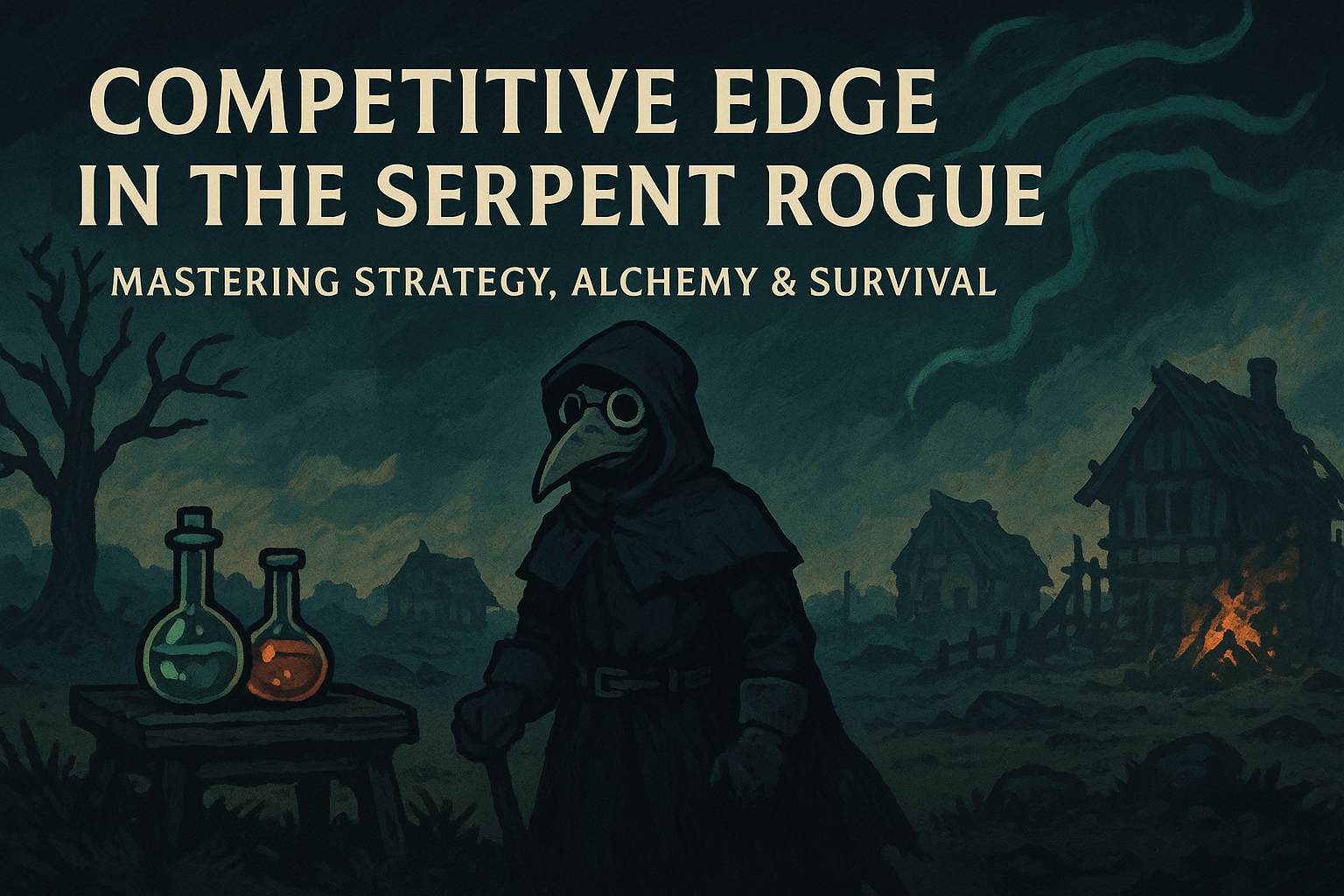1. Introduction
In the world of indie action-adventure games, The SerpentRogue stands out with its haunting atmosphere, complex alchemy system, and dynamic survival mechanics. Players take on the role of The Warden, a masked plague doctor charged with restoring balance to a realm devastated by corruption. But success in this game isn’t guaranteed—it requires insight, experimentation, and strategy.
To gain a competitive edge The SerpentRogue, you must understand how every element of the game connects. From crafting potions to navigating corruption storms, this guide will walk you through every essential skill to outwit enemies, survive harsh conditions, and ultimately master the game’s systems.
2. Core Gameplay Mechanics
The foundation of The Serpent Rogue revolves around exploration, resource management, and transformation. It’s not a game where brute force guarantees victory—instead, it’s about clever decisions and strategic planning.
You’ll explore a series of areas that change with time and corruption. Each zone has environmental hazards, creatures, and hidden secrets. Your goal is to prepare thoroughly before each expedition and adapt to whatever the world throws at you.
Combat is deliberate and can be punishing. Every swing consumes stamina, every dodge matters. Yet, violence isn’t always necessary. Alchemy allows for alternatives—turning foes into allies or avoiding conflict altogether.
3. Alchemy: The Heart of Mastery
Alchemy is not just a side activity—it’s the backbone of gaining an edge. Every item has associated keywords and properties, which interact with others during potion crafting.
For example:
| Ingredient | Keyword | Effect |
|---|---|---|
| Chamomile | “vitality” | Health restoration |
| Fish Bone | “ten” | Quantity effect |
| Nightshade | “remove” | Debuff effect |
Crafting involves combining ingredients with these keywords. For instance, using “add,” “five,” and “vitality” results in a potion that heals five health points.
To master alchemy:
- Experiment regularly – many recipes aren’t provided outright.
- Document combinations – keep track of successful (and failed) mixtures.
- Stockpile rare ingredients – some only appear during certain conditions.
A huge competitive edge in The Serpent Rogue is unlocked once you learn to craft transformation potions. These allow you to become animals or monsters—giving access to unique abilities and bypassing obstacles creatively.
4. Combat Strategies
Unlike traditional hack-and-slash games, The Serpent Rogue requires deliberate combat decisions. Enemies are strong, and reckless fighting will likely lead to death. You can, however, prepare in several ways:
- Scout areas before full engagement.
- Use potions for buffs or transformation.
- Employ traps and the environment—lure enemies into hazards.
- Equip the right weapon for the enemy. Blunt for armored foes, sharp for fleshy ones.
Combat also includes weapon degradation—overusing your gear without repair leads to broken tools. Always carry backups or alchemical enhancements.
The smartest players don’t always fight—they outthink. That’s the core of having a competitive edge in The Serpent Rogue.
5. Survival and Resource Management
Managing your character’s needs is critical. You must maintain hunger, corruption resistance, and inventory space. If neglected, your performance suffers.
Important survival tips:
- Cook food to reduce hunger effects.
- Sleep at your camp or rest points to recover.
- Cleanse corruption regularly using crafted potions or special items.
Also, your inventory has strict limits. Items decay over time. Don’t hoard unnecessarily. Instead, use storage chests and return to base frequently.
Building and upgrading your base, The Camp, adds long-term advantages. You’ll unlock crafting benches, potion stations, and even grow your own ingredients—creating a sustainable resource loop.
6. Navigating the Dynamic World
Time and weather drastically affect gameplay. Some creatures only appear at night; certain ingredients only spawn during specific conditions. Pay close attention to these changes.
Understanding corruption waves is key. These storms periodically sweep across areas, changing spawns and damaging everything in their path. Prepare beforehand by retreating or crafting corruption-resistant gear.
NPCs are also essential. They offer quests, resources, and lore. Helping them builds reputation and unlocks new gameplay features, like rare crafting materials or companions.
Make use of The Kiosk—a strange vending system allowing you to trade resources between areas. It’s an essential tool for organizing your supplies and gaining advantages without backtracking.
7. Companions and Creature Interactions
Taming creatures adds depth and strategy. Some animals fight alongside you; others carry gear or distract enemies.
To recruit:
- Offer food or items.
- Use potions to tame or transform.
- Maintain loyalty through care.
Companions can tank damage or trigger traps, giving you breathing space. Be mindful though—they can die, and their loss is permanent unless you brew specific revival potions.
Ethical choices also arise. Do you transform a human into a beast to help you? Or cure them and send them back to safety? The game reacts subtly to your decisions, adding richness to your journey.
8. Advanced Strategies for Competitive Edge
Once you understand the basics, start building habits that maximize efficiency:
- Pre-mission checklists: Stock up on potions, weapons, and taming items.
- Plan for failure: Expect deaths and learn from them.
- Reuse gear wisely: Upgrade or break down old items for parts.
- Create loadouts: Set up different kits for combat, exploration, or alchemy missions.
Here’s a simple Strategy Loop Table to follow:
| Phase | Action |
|---|---|
| Preparation | Craft potions, rest, equip weapons |
| Exploration | Gather ingredients, complete tasks |
| Retreat | Return before corruption wave or fatigue |
| Recovery | Store gear, heal, plan next move |
This loop ensures sustainability and continuous progression without loss.
9. Tips and Common Pitfalls
New players often:
- Waste ingredients on random crafting.
- Hoard too many items.
- Fight unnecessarily.
- Ignore the corruption system.
To gain and maintain a competitive edge in The Serpent Rogue, avoid these mistakes. The game rewards planning over panic. Keep notes, observe enemy behavior, and don’t rush objectives.
10. Conclusion
The Serpent Rogue is not your typical action-adventure game. It’s layered, tactical, and rewards thoughtfulness. By mastering its alchemy system, understanding creature behaviors, and planning your exploration strategy, you’ll naturally develop a competitive edge in The Serpent Rogue.
Other Articles
2009 Chevrolet C6500 Box Truck 13’6″ – Full Guide to Specs, Performance & Utility
Sports History Explored: Myrthorin Krylak’s Legacy in Athletics and Historiography
Re-EF-5K4451X Module: Full Guide to Features, Uses, Setup & Benefits








